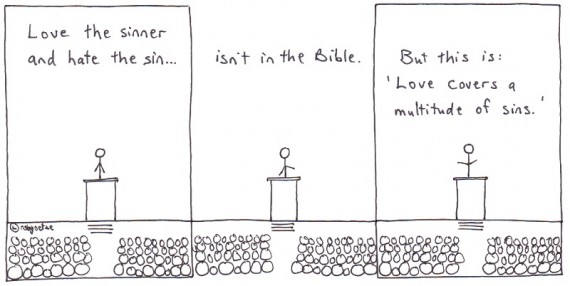
Congratulations, genuine readers. You have now successfully read more of this blog post than many others will.
Yes, it’s true. Many people only read the title of a blog post or article, and then leave a comment on it without reading anything else.
So if you have read this far, do NOT comment on this post, but instead, share it on Facebook or Twitter, then sit back to see what sort of comments come in from people who read nothing but the title.
This post is actually inspired by an April Fool’s Joke from NPR last year.
I was reminded of it this week when Al Mack posted one of my article son Facebook, and it was painfully obvious that most of those who commented had read nothing but the title. His most frequent reply was “It might help if you actually went and read the article.”














 It is common in Christian circles to hear admonitions to “Love the Sinner; hate the sin.”
It is common in Christian circles to hear admonitions to “Love the Sinner; hate the sin.” 
 The simple fact that we label the person we are talking about as a “sinner” indicates that we do not have love for them in the first place.
The simple fact that we label the person we are talking about as a “sinner” indicates that we do not have love for them in the first place.  When a watching world says Christians are full of hate, it is not a good strategy to tell them that we don’t hate them we just hate their sin.
When a watching world says Christians are full of hate, it is not a good strategy to tell them that we don’t hate them we just hate their sin. 

 When we say, “Love the sinner; hate the sin,” what we are really saying is “I will love only those I want to love, and I will hate and despise and cast out those people who do things I have decided are worse than the things I myself do, and this way I can make myself feel better while I condemn them for all the problems that I myself have contributed to but don’t want to admit.”
When we say, “Love the sinner; hate the sin,” what we are really saying is “I will love only those I want to love, and I will hate and despise and cast out those people who do things I have decided are worse than the things I myself do, and this way I can make myself feel better while I condemn them for all the problems that I myself have contributed to but don’t want to admit.”
 And why can’t that be enough? When we see someone else behaving in ways we don’t approve of and which we think is sin (and as long as it’s not illegal or harming someone), why can’t “love” be the only word that comes to our mind?
And why can’t that be enough? When we see someone else behaving in ways we don’t approve of and which we think is sin (and as long as it’s not illegal or harming someone), why can’t “love” be the only word that comes to our mind? 